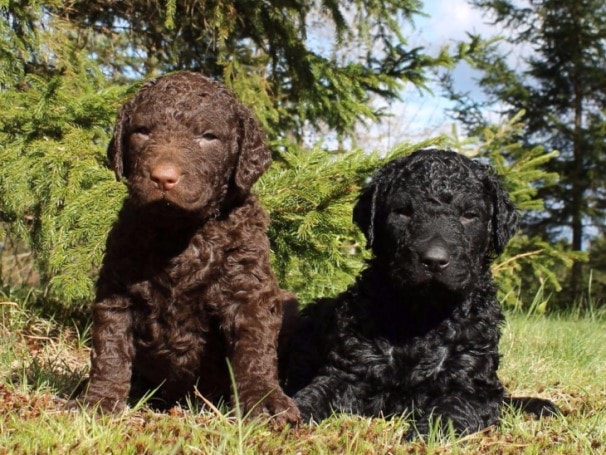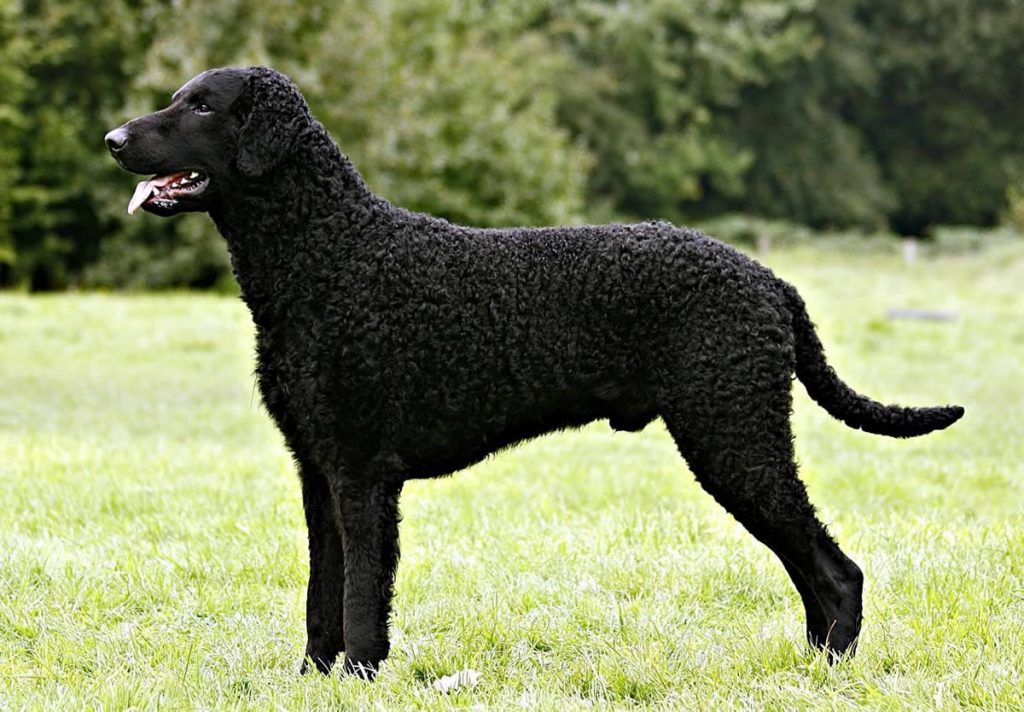Curly-Coated Retriever Dog Breed Information
General Information
| Dog Name | Curly-Coated Retriever |
|---|---|
| Other Names | CCR |
| Scientific Name | Canis lupus familiaris |
| Breed Type | Retriever |
| Group | Sporting, Gun Dog, Retriever |
| Breed For | Hunting on land and water |
| Extinct | No |
| Country of Origin | United Kingdom (UK) |
Physical And Size
| Size | Medium |
|---|---|
| Min Life Span | 10 |
| Max Life Span | 12 |
| Min Ideal Weight for male | 27 |
| Max Ideal Weight for male | 40 |
| Min Ideal Weight for female | 25 |
| Max Ideal Weight for male | 40 |
Ranking
| Intelligent Rank | |
|---|---|
| Trainability | |
| Playfulness | |
| Affection Level | |
| Social Needs | |
| Barking | |
| Watchdog Ability | |
| Territorial | |
| Mouthiness | |
| Adaptability |
Characterisitics
| Temperament | Confident, Smart, Energetic |
|---|---|
| Prey Drive | Yes |
| Fighting Dog | No |
Friendliness
| Stranger Friendly | Medium |
|---|---|
| Child Friendly | High |
| Cat Friendly | Medium |
| Dog Friendly | High |
| Office Friendly | Low |
| Apartment Friendly | Medium |
| Senior Citizens Friendly | Medium |
| Service Dog | Medium |
| Search and Rescue Dog | Medium |
| Biting Potential | Medium |
| Country of Origin | England |
| Nicknames and Other Names | CCR, Curly |
| Scientific Name | Canis lupus familiaris |
| Breed Type | Purebred |
| Group | Sporting Group, Gun dog, Retrievers Group |
| Bred For | Hunt on land and in water |
| Size | Medium-sized |
| Recognized By | FCI, AKC, CKC, UKC, KC |
| Life Span | 10-12 years |
| Ideal Weight | 60-95 pounds |
| Ideal Height | Male: 25-27 inches Female: 23-25 inches |
| Fur Type | dense, thick amount of tight, crisp curls, water and weather resistant |
| Common Colors | Black, Liver |
| Markings | None |
| Availability | Moderately available |
| Achievements | None |
| Suitable for Apartments | Moderately suitable |
| Used in World War | No |
| Most Similar To | Chesapeake Bay Retriever |
The Curly-coated Retriever is a large-sized dog whose body is little longer than its tail. This dog is recognized for its distinctive coat with tight curls and large tapered head make them apart from other retrievers.
With powerful, alert and graceful build, they make good watchdogs too. They are well- known for its protective capacity.
Origin
This large canine is considered to be one of the oldest retriever breed developed. Long ago, at about 18th century this dog was brought to retrieve from England, where it was developed.
This breed is developed from other breeds including the English Water Spaniel, the St. John’s Newfoundland, the retrieving setter, the Poodle and possibly the Irish Water Spaniel and the Labrador.
The Curly-Coated Retriever is known to be an excellent hunting companion and gun dog, waterfowl retriever and upland game hunter, with a gentle mouth. This dogs often used to hunt duck and quail.
This breed is very rare inside the USA but is more popular in Australia and New Zealand. This breed was first exported to America in 1907. This breed was recognized by the AKC in 1924.
Is Curly-Coated Retriever Safe to Kids?
This retriever go well with well-behaved children, especially with older children who can stand up to its size and energy level. They can be overwhelming with younger children.
For the safety of both, you need to set rules for both dog and child; no ear pulling, tail pulling or biting allowed. Never leave small children unsupervised with any dog including the Curly-coated retriever.
Behavior, Temperament and Personality
The Curly-Coated retriever is loyal gentle and eager to please dog. They
They are not fully matured until they are three years old. They are affectionate, loving and loving companion. They require adequate mental and physical exercise to keep them fit and healthy.
Socialize them well with people and other pets at their puppy age. If they are not properly balanced then in future they may be reserved or timid with strangers.
They love swimming, and make good therapy dogs as well. They are best choice for active and outdoor -oriented person.
Trainability
Training a Curly-coated retriever is easy if you are using correct training methods. They are smart and job-oriented breed, they approach everything with confidence as their job.
If they think that your training is silly or pointless, then they will less likely to
They are sensitive, so positive training will help you to take their attention. Instead of being strict or harsh for not doing well rather praise them for being good. Use reward and relationship-based method to motivate them.
Facts
Facts about Curly-coated retreiver:
- The Curly-Coated Retriever breed is also commonly known by the names Curly, Curly Coat, CCR.
- Lifespan
8 -13 years - Popularity #213 out of 244 Dog Breeds.
- Average Price
£775 for KC Registered
£550 for Non-KC Registered
Health Issues
| General Health | Healthy |
| Common Health Issues | Hip Dysplasia, Cataracts, Hypothyroidism, Cancer, Bloat, Obesity |
| Hypoallergenic | No |
| Vaccination Required | Rabies, Canine Parainfluenza, Kennel Cough, Canine Coronavirus, Canine Distemper, Canine Parvovirus, Leptospirosis |
| Shedding | Moderate Shedding |
| Drooling | Low Drooler |
| Grooming | Easy and Minimal Grooming Required |
| Weight Gain Potential | Average |
| Separation Anxiety | Moderate Chance |
| Allergies | None |
| Diets and Supplements | Protein: 30% Fat: 14% Glucosamine Multivitamins Omega-3 and 6 Fatty Acid |
Like so many other breeds, the Curly-coated retriever is known to suffer from some hereditary health problems, such as:
- Hip dysplasia
- Elbow dysplasia
- Glycogenosis (GSD) type IIIa
- Cataracts
- Cancer
- Bloat/Gastric Torsion
Coat Color
The Curly-coated retreiver are likely to found only in two colors; black and liver.
Puppies

If you are wishing to get a Curly-coated
Dogs similar to Curly-Coated Retriever
Other similar to Curly-Coated Retriever breed are:
- Labrador Retriever
- Flat-coated Retriever
- Chesapeake Bay Retriever
- Golden Retriever
- Nova Scotia Duck Tolling Retriever
Visit Doglime for more dog breed information and their behavior.











4 thoughts on “Curly-Coated Retriever Dog Breed Information”